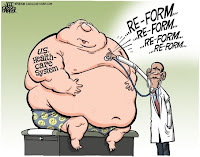
by Michael Handley
The Constitution of the State of Texas describes the structure and function of government for the State of Texas. The current Constitution, ratified on February 15, 1876, during the post civil war reconstruction era, is the seventh constitution in Texas' history. The previous six were the constitution of Coahuila y Tejas, the 1836 Constitution of the Republic of Texas and the state constitutions of 1845, 1861, 1866, and 1869.
In 1876, Texans were deeply suspicious of state government, which had been controlled by governors and legislators they considered "carpetbaggers" during the immediate post civil war period. In framing their post civil war constitution, those early Texans sought to limit the power of the governor and legislature by writing a detailed and highly restrictive state constitution. Many provisions of the Texas Constitution, which can be ammended only by popular vote of the people of Texas, are implemented as legislation in most other states. The Texas Constitution specifies that the governor and legislature has only those powers explicitly granted by the constitution; there is no equivalent clause to the federal constitution's "Necessary and Proper" clause. To change the funding or function of government agencies, the Texas legislature, which meets during the winter and spring of odd number years, often must pass legislation to place constitutional amendment measures on that year's November General Election ballot.
Since it was originally ratified in 1876, a total of 653 constitutional amendments have been proposed, of which 474 have been approved by voters and 179 have been rejected, as of November 2011. This fall voters will be asked to approve 9 amendments to the Texas Constitution. Each of the amendments on the November 2013 ballot have been approved by two-thirds of the Texas House and Senate and will require majority approval from voters to take effect.
- Authorizes a tax exemption for all or part of the market
value of the residences of spouses of military members who are killed in action.
HJR
62
- Eliminate a requirement for a State Medical Education Board
and a State Medical Education Fund. Neither is in operation, with the State
Medical Education Board having been defunct for more than a quarter-century.
HJR
79
- Extend the tax exemption period on storing aircraft parts
in the state and would provide more tax relief to aerospace manufacturers, which
often hold such parts in inventory for an extended period of time. HJR
133
- Give a partial property tax exemption on charity-donated
residences to disabled veterans or their surviving spouses. The amendment would
strike the current requirement that qualifying residents be "100
percent" disabled. HJR
24
- Allow homeowners age 62 or older to use reverse mortgages
to purchase residences. The current law only expressly allows traditional
mortgages, which lets such homeowners borrow against the equity of their homes.
The amendment would allow the prospective borrower to use a Federal Housing
Administration-insured home equity conversion mortgage to help buy a new home. SJR
18
- "Rainy Day Fund Amendment" to create two funds to
help finance key projects in the state water plan by pulling about $2 billion
from the Texas Economic Stabilization Fund. SJR
1
- Authorize home-rule municipalities to choose how to fill
city council vacancies if the positions have less than 12 months remaining in a
three- or four-year term. The amendment would remove the requirement to hold a
mandatory special election for those positions. HJR
87
- Repeal a constitutional provision authorizing the creation
of a hospital district in Hidalgo County. HJR
147
- Authorize the State Commission on Judicial Conduct to use
additional disciplinary actions — including public admonition, warning,
reprimand, or required additional training or education — against judges or
justices after a hearing. The current law allows the SCJC to issue a public
censure or recommend a judge's removal or retirement. SJR
42
 by Becca Aaronson and Alana Rocha, The Texas Tribune - September 9, 2013
by Becca Aaronson and Alana Rocha, The Texas Tribune - September 9, 2013